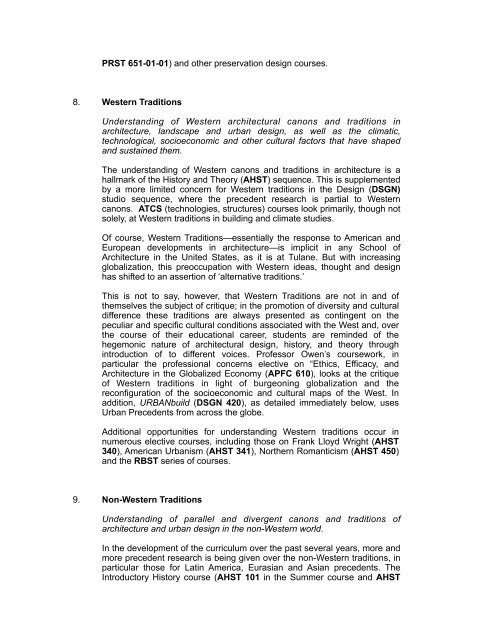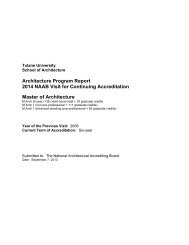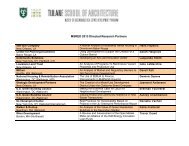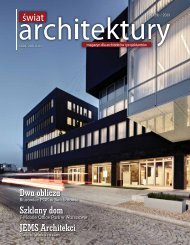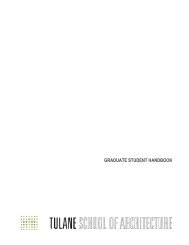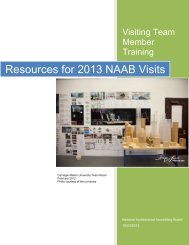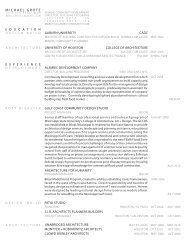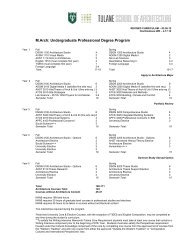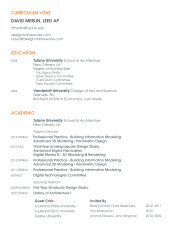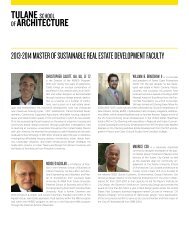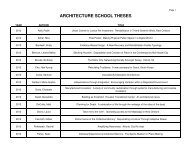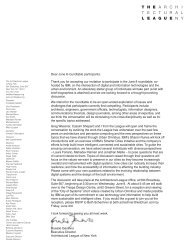Architecture Program Report Tulane University New Orleans ...
Architecture Program Report Tulane University New Orleans ...
Architecture Program Report Tulane University New Orleans ...
You also want an ePaper? Increase the reach of your titles
YUMPU automatically turns print PDFs into web optimized ePapers that Google loves.
PRST 651-01-01) and other preservation design courses.<br />
8. Western Traditions<br />
Understanding of Western architectural canons and traditions in<br />
architecture, landscape and urban design, as well as the climatic,<br />
technological, socioeconomic and other cultural factors that have shaped<br />
and sustained them.<br />
The understanding of Western canons and traditions in architecture is a<br />
hallmark of the History and Theory (AHST) sequence. This is supplemented<br />
by a more limited concern for Western traditions in the Design (DSGN)<br />
studio sequence, where the precedent research is partial to Western<br />
canons. ATCS (technologies, structures) courses look primarily, though not<br />
solely, at Western traditions in building and climate studies.<br />
Of course, Western Traditions—essentially the response to American and<br />
European developments in architecture—is implicit in any School of<br />
<strong>Architecture</strong> in the United States, as it is at <strong>Tulane</strong>. But with increasing<br />
globalization, this preoccupation with Western ideas, thought and design<br />
has shifted to an assertion of ‘alternative traditions.’<br />
This is not to say, however, that Western Traditions are not in and of<br />
themselves the subject of critique; in the promotion of diversity and cultural<br />
difference these traditions are always presented as contingent on the<br />
peculiar and specific cultural conditions associated with the West and, over<br />
the course of their educational career, students are reminded of the<br />
hegemonic nature of architectural design, history, and theory through<br />
introduction of to different voices. Professor Owen’s coursework, in<br />
particular the professional concerns elective on “Ethics, Efficacy, and<br />
<strong>Architecture</strong> in the Globalized Economy (APFC 610), looks at the critique<br />
of Western traditions in light of burgeoning globalization and the<br />
reconfiguration of the socioeconomic and cultural maps of the West. In<br />
addition, URBANbuild (DSGN 420), as detailed immediately below, uses<br />
Urban Precedents from across the globe.<br />
Additional opportunities for understanding Western traditions occur in<br />
numerous elective courses, including those on Frank Lloyd Wright (AHST<br />
340), American Urbanism (AHST 341), Northern Romanticism (AHST 450)<br />
and the RBST series of courses.<br />
9. Non-Western Traditions<br />
Understanding of parallel and divergent canons and traditions of<br />
architecture and urban design in the non-Western world.<br />
In the development of the curriculum over the past several years, more and<br />
more precedent research is being given over the non-Western traditions, in<br />
particular those for Latin America, Eurasian and Asian precedents. The<br />
Introductory History course (AHST 101 in the Summer course and AHST


